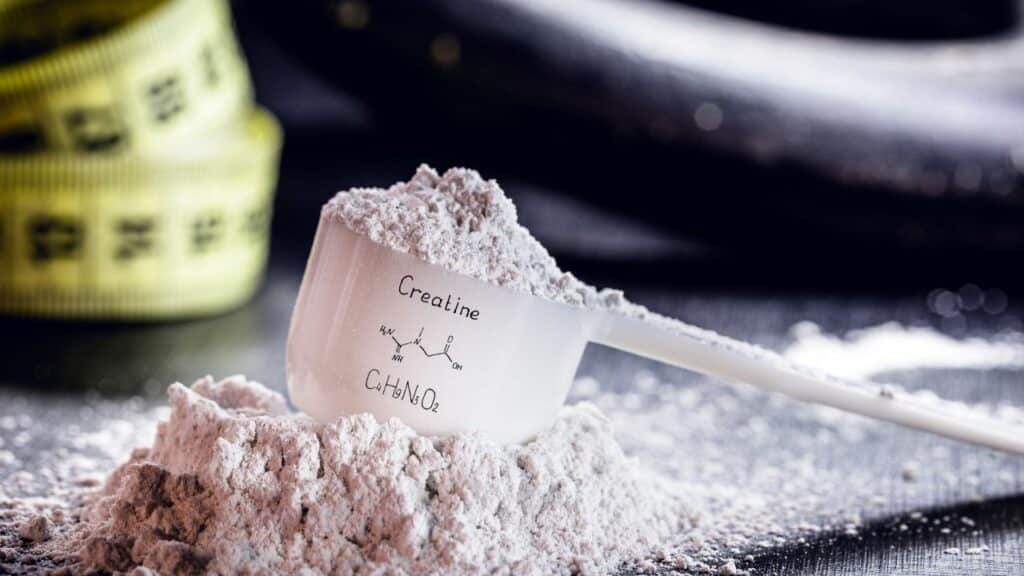Up to 74% of all athletes and bodybuilders supplement Creatine. With this in mind, it’s no wonder people new to bodybuilding are so interested in this substance.
One of the most common questions is – does Creatine make you hungry?
The short answer is that no, creatine doesn’t make you hungry, but you may still consume more calories while on Creatine.
Wondering how? Be sure to read until the end of the article for a clearer explanation.
Table of Contents
What is Creatine?

Creatine is an organic compound found naturally in your muscle cells. Many people believe it to be a protein, but that’s not the case.
Creatine is responsible for energy metabolism in muscles, which is why you’ll find yourself pumping out more reps while on it.
To maximize the effects of Creatine on your body, many bodybuilders go through a “loading” phase, which may additionally enhance energy production in your muscles.
Given that Creatine is a naturally found substance in your body, it shouldn’t be riddled with side effects like many of the other supplements bodybuilders use.
How Does Creatine Work?
To understand how Creatine works, we first must look at two main players in energy metabolism.
These are called ATP (adenosine tri-phosphate) and ADP (adenosine di-phosphate).
ATP is the main source of energy for your body, not just muscles and ADP is the precursor to ATP.
When ATP is used up as energy, it turns into ADP, which can later again be turned into ATP.
Here’s where Creatine comes into play, it helps ATP production by enhancing the conversion rates of ADP into ATP.
This leads to higher energy metabolism in your muscles and is the reason why many bodybuilders report a bigger rep count in the gym.
The latter will be very important when we’ll discuss increased caloric intake while on Creatine.
Does Creatine Make You Hungry?
No study up to date has ever shown Creatine to increase appetite. It simply doesn’t affect ghrelin or leptin in your body, those being the two main “hunger” hormones in your body.
Given all this, why do so many bodybuilders report an increased appetite while supplementing with Creatine?
The answer is quite simple, they use up more energy in the gym and their workouts are enhanced due to the effects of Creatine.
This all naturally leads to the body craving more food, as more calories are expended.
To recap, Creatine doesn’t increase appetite, but due to its energy-promoting effects, you end up losing more calories in the gym, leading to increased hunger.
This is great news because it means that you won’t gain weight while on Creatine, making it the perfect compound for both a cut, recomp or bulk.
Given its versatility, it’s no wonder nearly 4 out of 5 bodybuilders use Creatine as a supplement.
Also important to mention is that you’ll gain more muscle mass, which also expends energy, even while you’re resting, leading to higher caloric intake.
Last but not least, what many bodybuilders forget is that other supplements they use may also be at fault for their increased hunger.
I’ve known of cases where people used SARMs or even steroids, all while putting the blame on Creatine for their hunger pangs.
Are There Any Creatine Side Effects?
I want to take a moment to discuss two suspected side effects of Creatine that have been making the rounds in the bodybuilding world whenever this substance is mentioned.
Does Creatine Lead to Hair Loss
This is an important question I want to cover, simply because there’s so much controversy around it. Some bodybuilders report hair shedding, while others are wondering what the hell the former are talking about!
The reason why this is such a big conundrum is because a study found up to 60% increased DHT (dihydrotestosterone) levels in the body, after one to three weeks of daily Creatine supplementation.
If you didn’t know, DHT is suspected to be the main culprit for hair shedding, hair loss and even balding. We won’t delve much into the science of it, that’s beyond the scope of this article.
However, the findings of the study above were not able to be replicated and Creatine leading to hair loss is another myth that continues lingering amongst bodybuilders.
In twelve other studies, only two reported minor increases in DHT levels, while the others didn’t find any abnormalities.
Does Creatine Lead to Bloating or Water Retention
The answer is that it does, but only in the early stages of supplementation, according to this study.
The myth that you’ll suffer from permanent water retention while using Creatine is due to early, low-quality studies performed on this organic compound.
The science of today has a clear answer; not only will the initial water retention disappear after two to three weeks, but you won’t have any problems with it even after long-term supplementation.
Moreover, new research proves that daily Creatine intake doesn’t increase water retention and that the ratio of muscle mass to water percentage in the body remains stable.
Frequently Asked Questions (FAQ)
Can Creatine affect appetite?
Not directly, but due to its effects on muscle mass and energy production, you may consume more calories due to higher caloric expenditure.
Will Creatine make you gain weight?
Technically speaking, it shouldn’t, as you’re expending more energy in the gym. However, some people do report gaining weight while on Creatine, but that may be explained due to other supplements they’re using.
Will Creatine help me bulk up?
Yes, Creating is suitable for a bulk as it leads to bigger, stronger and more endurable muscles. All this will lead to an appetite increase and you’ll essentially be substituting fat for muscle mass.
Can I still take Creatine while cutting?
Of course! Creatine will help you build lean muscle mass with ease! However, be aware that your hunger pangs may be increased due to higher energy expenditure. Keep a cool head and be aware of that effect.
How long does it take for Creatine to show results?
Creatine takes about a week to build-up in the body, that’s why many professional bodybuilders go through a loading phase. You’ll experience the first effects of Creatine 7 to 10 days of daily supplementation.





